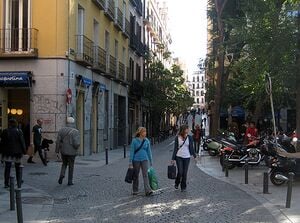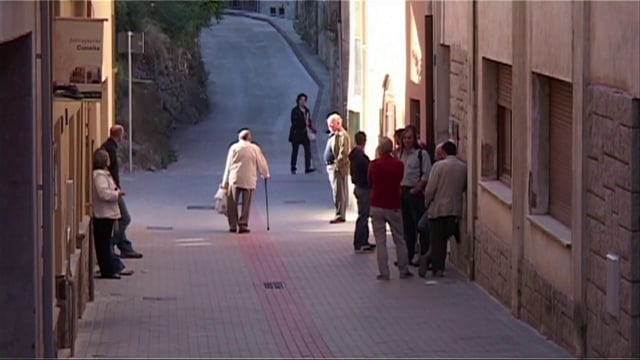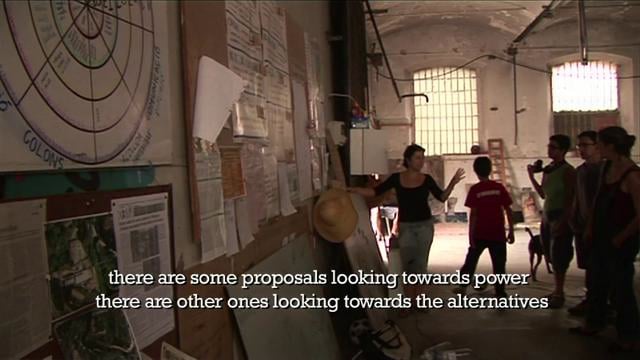
The aim of this page is to recognise, celebrate and encourage the self-empowerment of community agency networks (CANs) and community groups' activism for climate, environment and many other sustainability topics across Spain. Spain community resources is a separate page.
 Madrid’s summers can be brutally hot. So why are so many of our trees being chopped down? Felicity Hughes, theguardian.com (Aug 15, 2024)
Madrid’s summers can be brutally hot. So why are so many of our trees being chopped down? Felicity Hughes, theguardian.com (Aug 15, 2024)  Barcelona protests: holiday hotspots need fairer tourism for local communities, theconversation.com (Aug 08, 2024)
Barcelona protests: holiday hotspots need fairer tourism for local communities, theconversation.com (Aug 08, 2024)  Thousands rally in Spain's Canary Islands against mass tourism, BBC News (Apr 20, 2024)
Thousands rally in Spain's Canary Islands against mass tourism, BBC News (Apr 20, 2024)
Networks and sustainability initiatives[edit | edit source]
- IbizaPreservation, "works to preserve Ibiza and Formentera's land and sea. Our vision is for the islands to be a model of sustainability, where the preservation of the islands' exceptional natural beauty and resources contribute to local well-being and prosperity." added 08:59, 19 October 2022 (UTC)
- Ecologistas en Acción (Wikipedia): una confederación más de 300 grupos ecologistas de toda España con una estructura asamblearia y cuya unificación se produjo en diciembre de 1998. Forma parte del llamado ecologismo social, que entiende que los problemas medioambientales tienen su origen en un modelo de producción y consumo cada vez más globalizado e insostenible (productivismo y consumismo), del que derivan también otros problemas sociales; modelo que consideran necesario transformar si se quiere evitar la crisis ecológica. Pretenden asimismo recuperar la conciencia de los límites de la biosfera. Para ello realiza campañas de sensibilización así como denuncias públicas contra aquellas actuaciones que dañan el medio ambiente. Ecologistas en Acción edita además la revista El Ecologista, tomando el relevo de Gaia en 1999.
- Translations of transition materials
- #PalmaSostenible on twitter
- SUSTAINABLE ISLANDS, information on the Sustainable Tourism Tax in the Balearic Islands, added 14:39, 14 August 2024 (UTC)
Bioregionalism[edit | edit source]
- Resilience Earth, Reviving the Re·Generation of the earth, (Catalonia), "non-profit change management cooperative, committed to community resilience, regenerative design and the social and solidarity economy as fundamental tools for social, ecological and economic transformation." Video: Resilience Earth on youtube.com
Community and voluntary action[edit | edit source]
Andecha (from Latin indictia 'announcement) is voluntary, unpaid and punctual aid to help a neighbor carry out agricultural tasks (cutting hay, harvesting potatoes, building a barn, collecting apples to make cider, etc.). The work is rewarded with a snack or a small party and the tacit commitment that the person assisted will come with their family to the call of another andecha when another neighbor requests it. It is very similar to the Irish meitheal.
It should not be confused with another Asturian collective work institution, the sestaferia. In this, the provision of the service is mandatory (under penalty of fine) and is not called a to help of an individual but the provision of common services (repair of bridges, cleaning of roads, etc.) W
Community involvement[edit | edit source]
The anti-austerity movement in Spain, also referred to as the 15-M Movement (Spanish: Movimiento 15-M), and the Indignados Movement, was a series of protests, demonstrations, and occupations against austerity policies in Spain that began around the local and regional elections of 2011 and 2012. Beginning on 15 May 2011, many of the subsequent demonstrations spread through various social networks such as Real Democracy NOW (Spanish: Democracia Real YA) and Youth Without a Future (Spanish: Juventud Sin Futuro).
Spanish media related the movement to the 2008–2014 Spanish financial crisis, the Arab Spring, as well as demonstrations in North Africa, Iran, Greece, Portugal, and Iceland. The movement was also compared to Stéphane Hessel's political manifesto Time for Outrage!, which was seen to empower Spanish youth who were not in education, employment, or training (NEET). Protestors rallied against high unemployment rates, welfare cuts, politicians, and the two-party system in Spain, as well as the political system, capitalism, banks, and public corruption. Many called for basic rights, of home, work, culture, health, and education. The movement transferred to Europe the model of the protest camp which had been formed in the Arab Spring, adapting it to a more countercultural framework. This would later expand until influencing the creation of Occupy Wall Street.
According to RTVE, the Spanish public broadcasting company, between 6.5 and 8 million Spaniards participated in these events.
Sustainable transport activism[edit | edit source]
- Compartir coche: ¿viajamos juntos? Comunidad para compartir coche en España y Argentina.
Cycling activism[edit | edit source]
Ciclismo
- Conbici.org confederación de asociaciones ciclistas de España y Portugal. Su página contiene noticias e información sobre iniciativas como la creación de una Red Básica ciclista. Entre otras actividades, conbici es miembro del Consejo Superior de Tráfico y Seguridad de la Circulación Vial, en representación del colectivo de ciclistas en la vía pública. link checked 17:37, 23 October 2022 (UTC)
- Red de Ciudades por la Bicicleta
- Sevilla: Sevilla - Sevici
Maps
Education for sustainability[edit | edit source]
Abrazo House, ecological study centre located in the Aras Valley, Cantabria, northern Spain - AVALON Sustainability School
Biodiversity[edit | edit source]
In 2010 and 2011, an unrelated initiative in the village of San Cebrián de Mudá (190 inhabitants) in Palencia, northern Spain released 18 European bison (a species extirpated from Spain since the Middle Ages) in a natural area already inhabited by roe deer, wild boar, red fox and grey wolf, as part of the creation of a 240-hectare "Quaternary Park". Three Przewalski's horses from a breeding center in Le Villaret, France were added to the park in October 2012. Onagers and "aurochs" were planned to follow.
In 2016 and 2018, the True Nature Foundation reintroduced in total 7 European bison of the Lowland-Caucasian breeding line in Anciles Wildlife Reserve in the Parque Regional de Picos de Europa in the Cantabrian mountains in northern Spain. W
Environment quality[edit | edit source]
Ibiza Limpia keeping Ibiza clean and tidy
Trees, woodland and forest[edit | edit source]
Reforestación: Fundación Apadrina un Árbol, Proyecto de reforestación de área quemada en Guadalajara, España - malagareforesta.org Plan municipal de reforestación que incluye proyectos como éste de apadrinamiento de árboles.
Rural sustainability[edit | edit source]
Plan Estratégico Nacional de Desarrollo Rural 2007-2013, 2006
Towards sustainable economies[edit | edit source]
- Calafou, postcapitalist ecoindustrial colony
- Red Renta Basica (Basic Income Network)
Wikipedia: Mondragon Corporation: corporation and federation of worker cooperatives based in the Basque region of Spain. It was founded in the town of Mondragón in 1956 by graduates of a local technical college. Its first product was paraffin heaters. It is the seventh-largest Spanish company in terms of asset turnover and the leading business group in the Basque Country. At the end of 2012, it employed 80,321 people in 289 companies and organizations in four areas of activity: finance, industry, retail and knowledge. Mondragon cooperatives operate in accordance with Statement on the Co-operative Identity maintained by the International Co-operative Alliance.
Sustainable livelihood[edit | edit source]
- vivir sin empleo
- Catalan Integral Cooperative on p2pfoundation.net, The Catalan Integrated Cooperative originally published in Spanish on October 25th 2011
About Spain[edit | edit source]
Campaigns
- Alianza Mar Blava, Ibiza y Formentera zona libre de prospecciones
- Ni en Baleares ni en Canarias, Firma para detener las prospecciones de petróleo, Greenpeace España
- savecanarias.org, no to oil drilling in the Canary Islands
Spain, formally the Kingdom of Spain, is a country in southwestern Europe with territories in North Africa. It is the largest country in Southern Europe and the fourth-most populous European Union member state. Spanning across the majority of the Iberian Peninsula, its territory also includes the Canary Islands in the Atlantic Ocean, the Balearic Islands in the Mediterranean Sea, and the autonomous cities of Ceuta and Melilla in Africa. Peninsular Spain is bordered to the north by France, Andorra, and the Bay of Biscay; to the east and south by the Mediterranean Sea and Gibraltar; and to the west by Portugal and the Atlantic Ocean. Spain's capital and largest city is Madrid, and other major urban areas include Barcelona, Valencia, and Zaragoza.
Near you[edit | edit source]
Barcelona - Barcelona news - Madrid
See also[edit | edit source]
- Topic overview: Networks, Bioregionalism, Community and voluntary action, Community involvement,
- Spanish homepage, Sustainable transport activism, Cycling activism, Education for sustainability, Trees, woodland and forest, Rural sustainability, Towards sustainable economies, Sustainable livelihood
local information and news can be found, or shared, via our many location pages
External links
- Ecowiki: Portada (no recent edits found as of 00:21, 1 May 2014 (PDT))
- Agenda 21 - Jávea \ Xàbia






